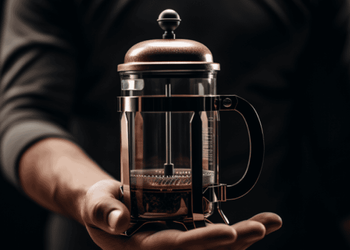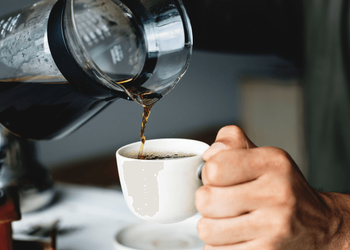
Vietnamese Phin Filter Vs French Press (7+ Differences)

French Press: Overview
What is a French press?
A French press, also known as a press pot or plunger pot, is a manual coffee maker that consists of a cylindrical glass or stainless steel container with a plunger and a metal or nylon mesh filter. It has been around for decades and is widely trusted when it comes to brewing coffee at home.
The process of making coffee with a French press involves steeping coarsely ground coffee beans in hot water for several minutes, and then pressing the plunger down to separate the brewed coffee from the grounds.
![White bodied French press coffee maker made up of glass]](https://uploads-ssl.webflow.com/638680794255d655ea1eac12/642a4bdf0e9e8109658a9b14_French%20press%20coffee%20maker.png)
What is a French press coffee maker good for?
A French press coffee maker is great for producing a full-bodied and flavorful cup of coffee with a rich aroma and texture. It allows the coffee to steep for a longer period of time than other brewing methods, which can result in a more complex flavor profile.
Additionally, the metal or nylon mesh filter of the French press allows the natural oils and flavors of the coffee beans to be present in the final cup.
What can you not use a French press coffee maker for?
Despite all its benefits, a French press coffee maker may not be suitable for everyone. For instance, if you prefer a cleaner cup of coffee with less sediment, a French press may not be the best option.
Additionally, French press coffee makers can be more difficult to clean than other coffee makers, and they may not keep the coffee as hot as some other brewing methods.
Pros and cons of the French press
Pros
- A French press produces a full-bodied and flavorful cup of coffee.
- It allows the coffee to steep for a longer period, resulting in a more complex flavor profile.
- Natural oils and flavors of the coffee beans can be tasted present in the final cup.
- French press does not require electricity, making it a great option for camping or traveling.
- It is a relatively inexpensive and durable option.
Cons
- It may not be suitable for those who prefer a cleaner cup of coffee with less sediment.
- Cleaning a French press might feel like a task.
- May not keep the coffee as hot as some other brewing methods.
- The plunger mechanism can be fragile and may require replacement over time.
Get the right insulated French press coffee maker from HERE.
Vietnamese Phin coffee filter: Overview
What is a phin coffee filter?
A phin coffee filter, also known as a Vietnamese coffee filter, is a small, single-serving coffee filter that is commonly used in Vietnam to make traditional Vietnamese coffee. It consists of a perforated metal filter basket that sits atop a small cup or mug and a screw-on press that is used to compress the coffee grounds.

Coffee beans are ground coarsely and added to a drip filter known as a Phin. Using a thin lid, the beans are weighted down and then poured into the phin. The water slowly seeps through into the cup.
For the drip to produce enough coffee to be enjoyed, the process needs to be repeated at least twice. The coffee produced with this method has a rich mouthfeel and is quite jolting.
What is a phin coffee filter good for?
A phin coffee filter is great for making a strong and flavorful cup of coffee with a distinctive taste and aroma.
The slow drip process of the phin filter allows the coffee to steep for a longer period, resulting in a strong, concentrated brew.
Additionally, the metal filter of the phin allows the natural oils and flavors of the coffee beans to be present in the final cup.
Get the right stainless steel phin filter from HERE.
What can you not use a phin filter for?
If you prefer a cleaner cup of coffee with less sediment, a phin filter may not be the best option. Moreover, phin filters are generally designed for single servings and may not be suitable for making larger quantities of coffee.
Pros and cons of Vietnamese phin coffee filter
Pros
- A phin coffee filter produces a strong and flavorful cup of coffee with a distinctive taste and aroma.
- You can leave the filter unattended as it extracts your coffee.
- It allows the coffee to steep for a longer period of time, resulting in a concentrated brew.
- It falls in the category of affordable coffee makers.
- It is easy to carry, making it a great option for travel or camping.
- The filter is easy to wash.
Cons
- It is generally designed for single servings and may not be suitable for making larger quantities of coffee.
French press coffee maker vs. phin coffee filter: Quick comparison
The main difference between a phin filter is a gravity drip method that allows ground coffee to slowly mingle with hot water. On the other hand, the French press employs full-immersion brewing, where coarsely ground coffee steeps in hot water, and a plunger with a coarser metal or mesh filter separates the grounds from the liquid.
Phin filter is known to produce a lighter and smoother coffee with a milder flavor profile. On the other hand, a French press coffee maker produces a robust and full-bodied coffee with rich oils and sediment, delivering a bold and intense coffee experience.
Let's explore other differences.
1) Design and construction
The French press is a glass or stainless steel cylinder with a plunger and a metal or plastic mesh filter. The phin coffee filter is a small metal or plastic device with a filter basket on top and a base that sits on your cup.
2) Brew time
The French press typically takes 4-5 minutes to brew coffee, while the phin filter takes 2-3 minutes. The difference in brew time is due to the French press needing more time for steeping and extraction, whereas the phin filter uses gravity to drip the water through the coffee.
3) Grind size
Both the French press and phin filter require medium to coarse-grind coffee for best results.
4) Brew strength and flavor
The French press is known for producing rich and full-bodied coffee with higher oil content, while the phin filter produces a lighter-bodied coffee with a clean taste and more pronounced acidity.
5) Ease of use
The French press is easy to use but requires more cleanup and maintenance than the phin filter. The phin filter is a simpler device that is easy to clean and maintain.
6) Serving-size
French presses come in various sizes ranging from a single cup to large sizes, making them perfect for brewing coffee for a group. Phin coffee filters are typically designed for single servings.

7) Convenience
The French press requires a bit of effort to prepare and clean up as you have to heat the water separately and then carefully pour it over the coffee grounds. The phin coffee filter is relatively more convenient and requires less effort, making it perfect for those who want to brew coffee quickly.
8) Price
French presses can range from relatively inexpensive to expensive, depending on the size, brand, and material used. Phin coffee filters are generally less expensive and more affordable.
What should you choose between the French press vs. the phin coffee filter?
Still confused? Let’s trim down the answer for you.
Both French press and Phin coffee filters have unique features and characteristics that make them popular brewing methods. A lot depends on your preference for taste, convenience, and budget.
If you prefer a bold and robust flavor, are willing to put in some effort, and need to brew for a group, the French press is a good option.
On the other hand, if you want a smoother and milder taste, prefer quick and easy brewing, and typically make single servings, the Phin coffee filter is an excellent option.
Wrapping up on the difference between the phin coffee filter and the French press coffee filter
To sum it up, the French press offers a bold and robust flavor with the ability to brew coffee for a group, but it requires more effort and cleaning.
On the other hand, the Vietnamese phin coffee filter produces a milder and smoother taste with less effort and a single-serving capacity.
The choice between the two ultimately depends on personal preference for taste, convenience, and budget. Both coffee brewing methods are worth exploring for coffee lovers seeking a different experience and taste.

I am a barista by profession hailing from NC. My journey began in my late teens when I started working as a barista in a local coffee shop. My passion for coffee quickly became evident as I immersed myself in the art of espresso extraction, latte art ...



